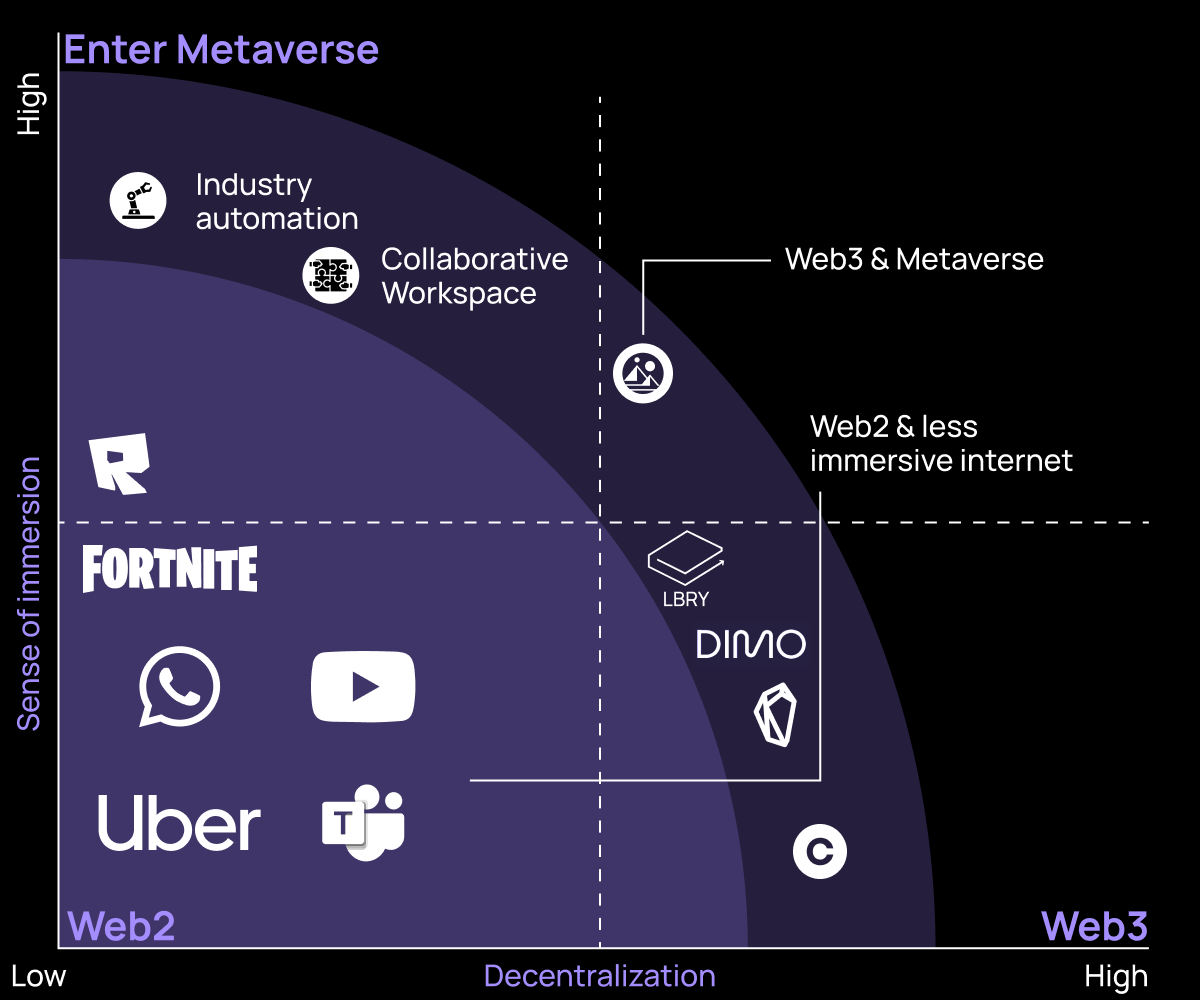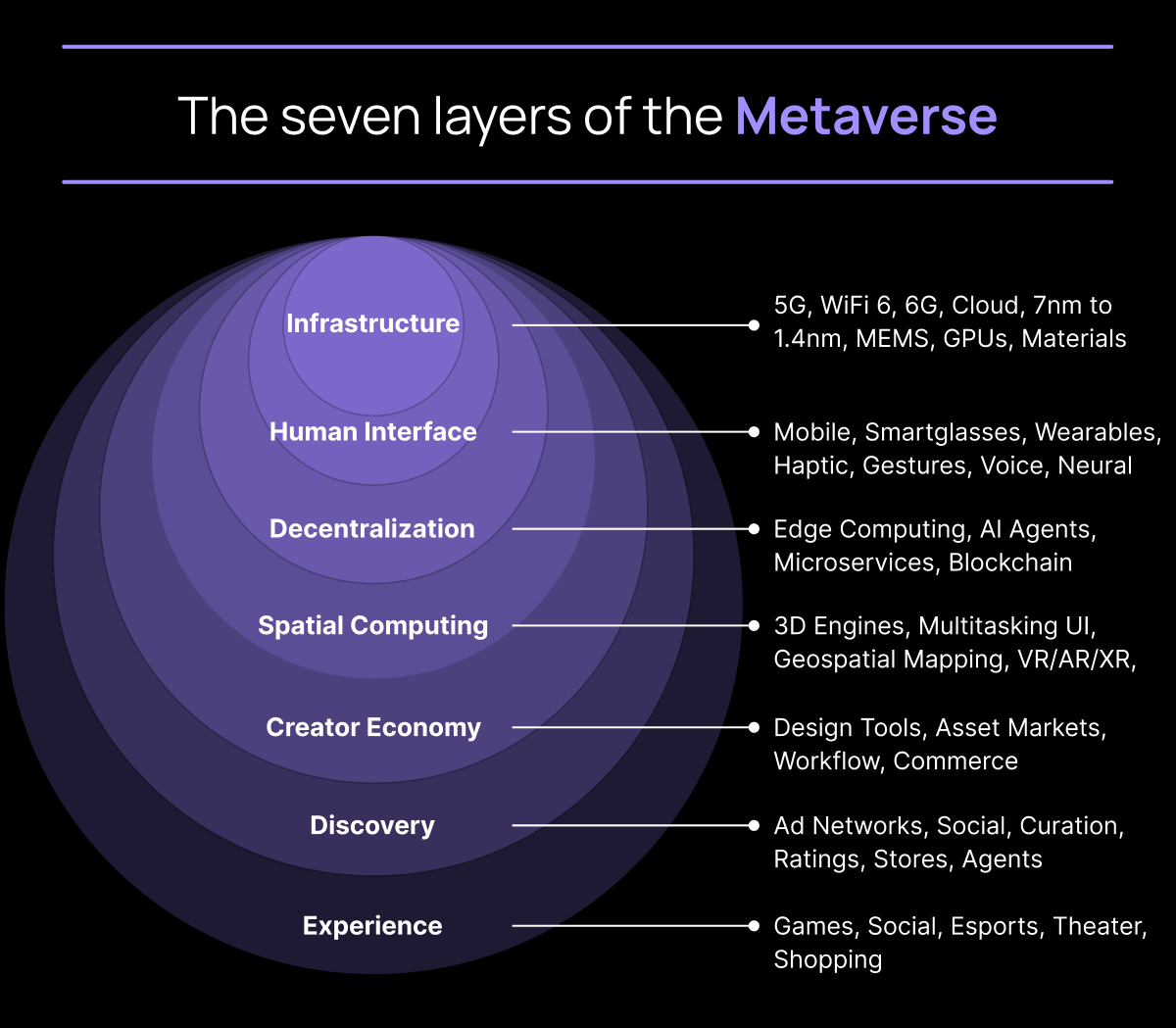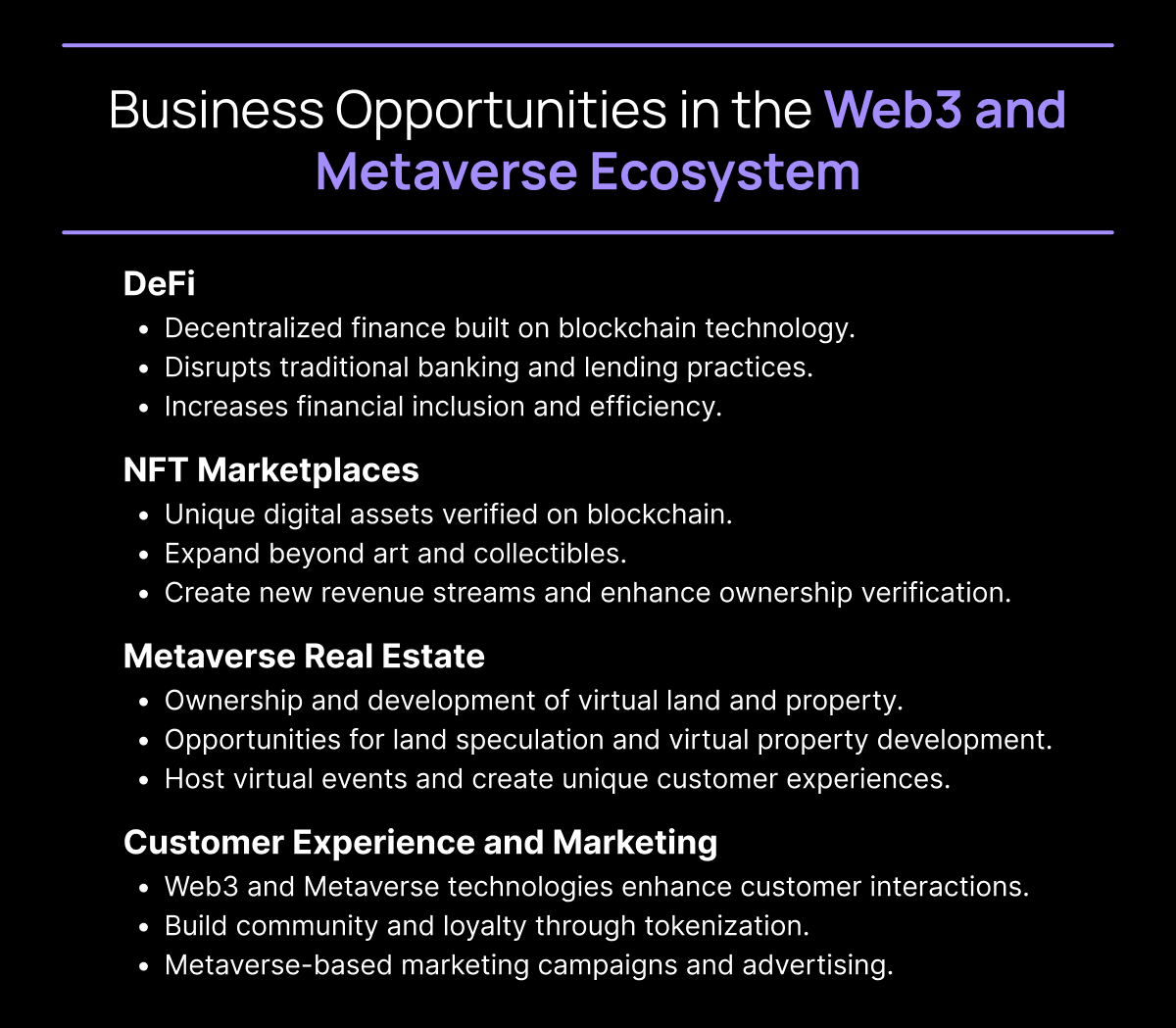Web3 and the Metaverse: A New Era for Business in the UAE
August 12, 2024

Vivek Adatia
.png?w=1920&q=75)
Web3 and the Metaverse are redefining the digital space at an unprecedented pace. Before we start with anything else, let’s understand what is the difference between Web3 and Metaverse. Web3, the latest iteration of the Internet, introduces decentralization, blockchain technology, and user ownership of data. The Metaverse, a collective virtual shared space, combines virtual and augmented reality to create immersive digital experiences. Together, these technologies show strong promise to reinvent how businesses operate and interact with customers.
The United Arab Emirates has positioned itself as a global leader in emerging technologies. With a forward-thinking approach and strategic investments, the UAE has cultivated a thriving ecosystem for innovation. Its commitment to digital transformation and economic diversification has made it a regional tech hub. This strategic focus, coupled with a business-friendly environment, provides fertile ground for the growth of Web3 and Metaverse development services in the UAE.

The convergence of Web3 and Metaverse technologies presents unprecedented opportunities for businesses in the UAE. By tapping into these technologies, organizations can open up new revenue streams, improve operational efficiency, and promote deeper connections with customers. This blog underlines the potential impact of Web3 and Metaverse on the UAE business space, providing insights into building successful strategies in this new era.
Understanding the UAE's Web3 and Metaverse Scenario
The UAE is cultivating a conducive environment for Web3 and Metaverse innovation. The government’s proactive stance in regulating and supporting these technologies has been instrumental in driving industry growth.
Dubai, in particular, has taken significant strides through the establishment of the Virtual Asset Regulatory Authority (VARA). VARA's role in licensing and supervising virtual asset activities has provided a clear regulatory framework, attracting global investors and businesses to the region. This regulatory clarity, combined with Dubai's strategic location and business-friendly policies, has positioned it as a leading hub for Web3 and Metaverse applications development.
Abu Dhabi, on the other hand, has focused on blockchain technology as a foundation of its digital economy. The emirate's investments in blockchain infrastructure and research have created a strong ecosystem for blockchain-based applications. This emphasis on foundational technologies lays a strong foundation for future Metaverse initiatives.
Apart from government support, the UAE is witnessing a rise in Web3 and Metaverse adoption across various industries. Early-stage startups and established enterprises are exploring innovative use cases to capitalize on these emerging technologies. From real estate platforms incorporating virtual property ownership to financial institutions offering blockchain-based services, the UAE is home to a growing number of pioneering projects.
Understanding the UAE's unique position as a Web3 and Metaverse hub is essential for businesses seeking to tap into these technologies. By analyzing the government's initiatives, industry trends, and successful case studies, organizations can develop informed strategies to thrive in this dynamic space.
Web3 and Metaverse Infrastructure in the UAE
The successful realization of Web3 and Metaverse applications depends on efficient infrastructural underpinnings. Here are the critical components supporting these technologies within the UAE.
Blockchain Infrastructure
Blockchain, the foundational technology of Web3, necessitates a solid infrastructure. The UAE is evaluating a spectrum of blockchain platforms, each distinguished by its unique strengths and limitations. Key considerations for platform selection include scalability, security, and regulatory compliance.
- Platform Diversity: The UAE is exploring a range of blockchain platforms, including permissioned and permissionless networks. Public blockchains like Ethereum and Bitcoin offer decentralization and transparency, while private blockchains provide greater control and privacy.
- Scalability Challenges: As blockchain adoption grows, scalability becomes a critical issue. Solutions such as sharding, layer-2 scaling, and consensus algorithm optimizations are being explored to improve transaction throughput and reduce latency.
- Interoperability: The efficient exchange of data and assets between different blockchains is essential for a thriving Web3 ecosystem. Interoperability protocols and standards are being developed to facilitate cross-chain communication.
- Blockchain Service Providers: The role of blockchain service providers is vital in supporting businesses. These entities offer infrastructure, development tools, and expertise, accelerating the development and deployment of blockchain applications.
Metaverse Infrastructure

The creation of immersive Metaverse experiences demands sophisticated hardware and software components. High-performance computing, virtual reality (VR), augmented reality (AR), and mixed reality (MR) devices are essential building blocks. An effective, low-latency network is crucial for real-time interactions within the Metaverse.
- Computational Power: A Metaverse development company in the UAE might require substantial computational resources. High-performance computing (HPC) infrastructure, including graphics processing units (GPUs) and specialized hardware accelerators, is crucial for rendering complex virtual environments.
- Network Infrastructure: Low-latency, high-bandwidth networks are essential for smooth Metaverse experiences. 5G technology is a foundational component, providing the necessary speed and reliability. However, the onset of 6G technology promises to further improve connectivity and capacity.
- Cloud and Edge Computing: A hybrid approach combining cloud and edge computing is often employed to address the computational demands of the Metaverse. Cloud computing offers scalable resources for data storage and processing, while edge computing brings computation closer to users, reducing latency and improving responsiveness.
- Device Compatibility: A diverse range of devices, including VR headsets, AR glasses, smartphones, and computers, need to be supported for widespread Metaverse adoption. Ensuring compatibility and interoperability across different platforms is a key challenge.
Business Opportunities in the Web3 and Metaverse Ecosystem

The convergence of Web3 and the Metaverse offers a number of business opportunities. Two prominent areas with notable potential are Decentralized Finance (DeFi) and Non-Fungible Tokens (NFTs).
Decentralized Finance (DeFi)
DeFi, a financial system built on blockchain technology, offers a new framework for financial services. In the UAE, DeFi can disrupt traditional banking and lending practices. By providing access to financial services without intermediaries, DeFi can increase financial inclusion and efficiency. However, challenges such as volatility, regulatory uncertainties, and security risks need to be addressed.
- Potential in the UAE: DeFi can revolutionize areas like lending, borrowing, and asset management in the UAE. It can facilitate cross-border transactions, boost liquidity, and provide alternative investment options.
- Challenges and Opportunities: Building trust, ensuring regulatory compliance, and addressing scalability are key challenges for DeFi adoption. Collaborations between traditional financial institutions and DeFi platforms can create synergistic opportunities.
- Regulatory Considerations: A clear regulatory framework is essential for the growth of DeFi in the UAE. Balancing innovation with consumer protection is crucial.
NFT Marketplaces
NFTs, unique digital assets verified on blockchain, have gained considerable popularity beyond art and collectibles. The UAE can tap into its position as a global trade hub to establish itself as a leader in the NFT market.
- Expanding NFT Use Cases: NFTs have applications in real estate, gaming, music, and luxury goods. Tokenizing assets can create new revenue streams and enhance ownership verification.
- Building NFT Marketplaces: Developing solid NFT marketplaces requires technical expertise, marketing capabilities, and a deep understanding of user preferences. Integration with payment gateways and digital wallets is essential.
- Intellectual Property Rights: Protecting intellectual property rights is crucial for the NFT ecosystem. Clear guidelines and enforcement mechanisms are needed to prevent counterfeiting and copyright infringement.
Metaverse Real Estate
Metaverse real estate involves the ownership and development of virtual land and property within digital environments. The UAE, known for its ambitious real estate projects, can position itself as a pioneer in this emerging market.
- Opportunities and Challenges: Metaverse real estate offers opportunities for land speculation, virtual property development, and hosting virtual events. However, standardization of virtual land measurements, legal frameworks for property ownership, and user experience are key challenges.
- Integration with Physical Real Estate: Metaverse real estate can complement physical real estate by providing virtual representations of properties, facilitating virtual property tours, and offering additional revenue streams through virtual spaces.
- Metaverse-Based Events and Experiences: Virtual land can host a variety of events, from concerts and conferences to virtual retail experiences. This can attract new audiences and create unique revenue streams.
Customer Experience and Marketing
Web3 and Metaverse technologies offer never-before-seen opportunities to boost customer experiences and marketing strategies. By utilizing these technologies, businesses can build deeper connections with customers and create new revenue streams.
- Enhanced Customer Interactions: Blockchain technology can allow for secure and transparent customer data management, leading to personalized experiences. Metaverse platforms provide immersive environments for customers to interact with brands and products.
- Building Community and Loyalty: Tokenization can be used to create loyalty programs, rewarding customers with digital assets. Building online communities through virtual spaces promotes engagement and brand loyalty.
- Metaverse-Based Marketing Campaigns: Metaverse platforms offer new avenues for advertising and product launches. Virtual events, product demonstrations, and interactive experiences can create memorable brand impressions.
Challenges and Considerations
The successful adoption and growth of Web3 and Metaverse requires addressing several challenges.
Security and Privacy
The decentralized nature of Web3 and the immersive experiences of the Metaverse introduce new security and privacy risks. Addressing vulnerabilities such as smart contract exploits, phishing attacks, and data breaches is crucial. Businesses must implement effective security measures, including encryption and multi-factor authentication.
Plus, protecting user data in a decentralized environment requires innovative approaches. Privacy-enhancing technologies and clear data governance policies are necessary. Moreover, transparency and accountability are key to building trust in Web3 and Metaverse ecosystems. It is vital to maintain clear communication and adherence to ethical standards.
Talent Acquisition
The rapid evolution of Web3 and Metaverse technologies has created a significant skills gap. Acquiring and developing the necessary talent is a critical challenge.
- Skills Gap: Identifying and recruiting individuals with expertise in blockchain, virtual reality, augmented reality, and related fields is essential.
- Building a Skilled Workforce: Investing in training and development programs can help bridge the skills gap. Businesses must look to create opportunities for upskilling and reskilling existing employees.
- University Collaboration: Partnering with universities and educational institutions can promote talent development and research. Collaborations can lead to the creation of specialized academic programs and internships.
Scalability and Sustainability
The increasing adoption of Web3 and Metaverse applications raises concerns about scalability and sustainability. Addressing these challenges is essential for long-term growth.
The energy consumption of blockchain networks and Metaverse operations has environmental implications. So it is critical to explore energy-efficient solutions and promote sustainable practices. Furthermore, as user numbers and transaction volumes increase, Web3 and Metaverse platforms must scale efficiently. This necessitates technical advancements and infrastructure improvements.
Also, a holistic approach is required to ensure the long-term viability of Web3 and Metaverse ecosystems. This, in turn, requires balancing innovation with responsible development.
Case Studies
The UAE is home to a growing number of businesses pioneering the adoption of Web3 and Metaverse technologies.
Real Estate
- Dubai Properties: Dubai Properties has successfully integrated virtual reality into its property viewing process, allowing potential buyers to experience properties remotely. This has expanded their customer base and increased sales.
- Emaar Properties: Emaar has ventured into the Metaverse by creating virtual replicas of its iconic properties, facilitating virtual property tours and sales. The company is exploring opportunities for virtual land ownership and development within the Metaverse.
Tourism
- Dubai Tourism: Dubai Tourism has utilized augmented reality to create interactive city guides, providing tourists with immersive experiences and personalized recommendations. This technology enhances the overall tourist experience and boosts engagement.
- Emirates Airline: The airline has explored the use of virtual reality for in-flight entertainment and destination marketing, offering passengers immersive experiences.
Finance
- Emirates NBD: Emirates NBD, a leading banking institution, has implemented blockchain technology for secure and efficient cross-border payments. This innovation reduces transaction costs and speeds up processing times.
- ADCB: Abu Dhabi Commercial Bank (ADCB) has explored the use of blockchain for trade finance, allowing for secure and transparent transactions between businesses.
Conclusion
Web3 and Metaverse come together to open up exciting opportunities for businesses in the UAE. By understanding the underlying technologies, identifying opportunities, and addressing challenges, organizations can position themselves for long-term success.
The UAE's strategic focus on emerging technologies, coupled with a supportive regulatory environment, creates a fertile ground for innovation. As demonstrated by early adopters, the potential benefits of Web3 and Metaverse are substantial.
WDCS Technology , a reputed Metaverse and Web3 development company in the UAE, is committed to supporting businesses in their Web3 and Metaverse journey. Our team of experts offers a comprehensive range of services.
- Strategy Development: Crafting personalized Web3 and Metaverse strategies aligned with your business objectives.
- Technology Consulting: Providing guidance on technology selection, implementation, and integration.
Talent Acquisition: Assisting in building a skilled workforce through recruitment and training. - Security and Compliance: Ensuring effective security measures and regulatory compliance.
- Marketing and Branding: Developing effective marketing campaigns and building a strong brand presence in the Web3 and Metaverse space.
By partnering with WDCS, you can accelerate your digital transformation. Connect with us today for a free consultation.
Stand out as a pioneering business with our innovative Web3 and Metaverse solutions.
Position your business for success with our comprehensive Web3 and Metaverse solutions. We help you capitalize on merging technologies to create new revenue streams and build a competitive edge.